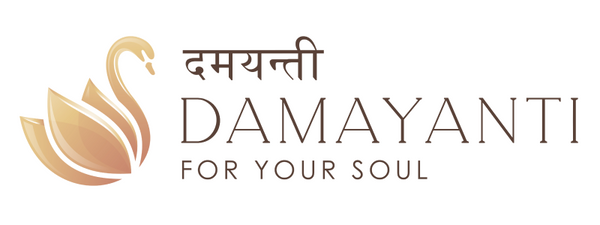In my last blog post I wrote about Damayanti, my new project showcasing jewellery and clothing designed to aid people on their spiritual journey. I also spoke of the word dama which means calm restraint, and I related the opening scenes of the story of Nala and Damayanti from the great epic story The Mahabharata.
Cultivating and mastering this quality of dama, calm restraint, is incredibly useful in every walk of life. In study or work or family matters, the ability to exercise calm restraint pays huge dividends. And this is absolutely true for those who have embarked on a journey to higher consciousness as well. The ability to gently restrain limiting habits that are stumbling blocks on the way, is a great aid to progress.
There is another wonderful traditional tale which tells us how the practice of virtue, including dama, can overcome negative impulses and habits. This is how the story goes:
The great Lord of the Universe, Brahmā created three types of beings. These were the Gods who lived in Heaven, Mankind who lived on earth, and the Demons who inhabited the darker places. These three races were all the children of Brahmā, and like a loving father he watched over them.
Each had their own natures. The Gods were radiant, powerful and majestic; Mankind was industrious, inventive and inquisitive; the Demons were energetic and strong and full of vigour. But each of them also had a weakness that kept them from fulfilling their full potential. As time went by Brahmā was saddened by what he saw.
When the Gods ruled in heaven, then peace and happiness held sway everywhere. In heaven the Gods lived in a blissful realm of pleasure. They fed on ambrosia and nectar, they listened to celestial musicians and choirs praising their beauty and their virtues. They played and danced and feasted. They were beguiled by the pursuit of kama – sensuous delights and pleasures. This meant that the Gods were unprepared when the Demons grew jealous and waged war on heaven. Taken unawares, the Gods were sometimes driven from heaven. Until the Demons could be dislodged then cruelty, violence, selfishness and conflict became the order of the day.
Mankind lived on earth, and people busied themselves with their responsibilities and duties. They worked hard producing food and wealth, they made laws and protected their families and clans. They toiled in their fields and built houses for themselves, and temples to the Gods. Each person sought to acquire good things for themselves and their families and those with whom they lived. For some, acquiring wealth became a driving obsession, for others it was friendship, others sought more and more knowledge, still others sought to increase their physical health and strength, others desired supreme military might. Whatever they believed to be good, people wanted more and more of it. All people became slaves to lobha - acquisitiveness and greed.
The Demons inhabited dark places, and they delighted in inflicting harm and creating conflict and discord. The Demons definitely had a weakness for kruratā – cruelty. They were jealous of the Gods who lived in heaven and of Mankind who lived on earth. They were naturally inclined to ruin anything that was good and true and harmonious. They delighted in disrupting the lives of men by sowing discord, anger, hatred and jealousy on earth. They were especially pleased when they could build up their strength and attack heaven itself and overthrow the Gods. This threw the universe out of balance until the Gods regrouped and rebuilt their strength. Then the Gods were able to defeat the Demons and send them back to the dark nether regions.
Brahmā, the Creator, saw all of this as he looked out from his divine golden palace. He pondered the problem for a long age until, in his meditation, he discovered the solution. He sent a message to Indra, the king of the Gods, Manu the lawgiver of Men, and Prahlada the leader of the Demons.
Each of these great beings obeyed the summons of their Heavenly Father. They arrived at the throne of Lord Brahmā where he sat next to his consort Saraswatī, the Goddess of Divine Energy and Wisdom. Brahmā sat silently as Indra, Manu and Prahlada took their seats.
Then Brahmā spoke a single syllable: “Dā!”
The sound echoed throughout the entire universe.
When it ceased to reverberate, Brahmā looked at his visitors and asked each of them in turn: “Have you understood the meaning of what you have heard?”
They bowed one after the other, and answered that they had indeed understood what they had been told.
Prahlada, the king of the Demons, returned to his people and addressed them all.
“We are the Demons,” he said, “we delight in conflict and war and cruelty. This makes us angry and aggressive. Although we can conquer the Gods and Men, this ultimately divides us against each other and renders us weak. The Heavenly Father spoke the syllable “Dā”. To overcome kruratā, cruelty, we need to practice dayā – compassion. This is how I interpret the teaching of our father Brahmā.”
Manu, the great lawgiver of Mankind, returned to earth and spoke to his people.
“We are human beings,” he said. “We spend our days working without end, seeking to acquire more and more of what we think is good. We have become acquisitive and greedy. As well as acquiring, we must learn to give. The Heavenly Father spoke the syllable “Dā”. To overcome lobha, greed, we therefore need to practice dānam – generosity and charitable giving. This is how I interpret the teaching of our father Brahmā.”
When Indra returned to the heavenly dwelling place of the Gods, he addressed them as well.
“We dwellers in heaven are seduced by pleasures and delights,” he said, “this is what makes us weak and vulnerable. The Heavenly Father spoke the syllable “Dā”. We must learn to restrain our desire for pleasure and luxury. To overcome kama, pleasure, we need to practice dama – calm disciplined restraint. This is how I interpret the teaching of our father Brahmā.”
That is how the story ends, but its meaning has obvious resonance for us. Let’s unpack it.
Three great vices characterise each of the children of the Creator. The Gods were overly fond of pleasure. Humanity was acquisitive and greedy. The Demons reveled in cruelty and inflicting suffering on others.
If we were to do an honest health check on ourselves, would we find anything like these vices? Enjoying the good things in life – music, relaxation, food and so on is, of course, perfectly fine. It is going overboard on any of these that becomes a debilitating weakness.
Again, working to acquire an income which in turn allows one to acquire necessities and some of the luxuries of life – housing, clothes, transport, recreation - is natural and wholly to be admired. Until it becomes an all-consuming fixation, where getting more and more and more takes over, until nothing else interests us.
Avoiding the cruelty of the demons is easier to understand. All of us would like to think of ourselves as basically compassionate, kind and tolerant. And for the most part that is indeed so. Our everyday interactions are full of small acts of kindness – exchanging a smile with a shopkeeper, opening a door for someone with their hands full, a bunch of flowers for a friend, making an extra cup of tea for our partner.
However, we can never be too careful or vigilant. What of hasty and thoughtless words, or a passive aggressive retort, or the guilty pleasure we might take when things don’t turn out for a rival at work, or the resentment when things and people don’t respond the way we want.
The story of Brahmā and his instruction to the Gods, Mankind and the Demons contains wonderful advice for us. It gives us three simple practical techniques to implement, all from “Dā”, one simple Sanskrit syllable.
First, we have dama, calm restraint. We can start with simple obvious indulgences like too much food and drink. Or time spent watching TV, or sleeping in. We all have our own unique list, and no one is required to disclose theirs! Just start with something that is achievable, so that the habit of restraint is strengthened. Then you can move on to harder or more persistent temptations.
Then there is dāna, generosity and charitable giving. Many of us already have our favourite charities and many already give very generously. That is wonderful. If some readers of this blog could do a little more, then that is all to the good.
My suggestion here is to broaden the giving to the mental and emotional realms. I mentioned in a previous blogpost the instruction from my teacher to give what you think you lack. So, if you feel a bit lonely give companionship. If you don’t feel you know very much, share your wisdom and knowledge. If you lack love than be affectionate. Again, this is not a one-size-fits all prescription. Reflect on where a little generosity is needed and resolve to be the one to start the ball rolling.
And finally, there is dayā, compassion. Take a deep breath and take an honest look at where the micro-aggressions and resentments cause you to speak or act in a way that is not kind or compassionate or forgiving. Take an intelligent stand and let that first impulse, that hasty word, fall back and let the words that do come out of your mouth be positive and uplifting.
These are practical ways of following the advice of Brahmā, contained in ‘Dā’, the single Sanskrit syllable, as interpreted by the Gods, Humanity and the Demons: dama, calm restraint; dāna, generosity; and dayā, compassion.
In this way, you will open a doorway into your life whereby you acquire the qualities and virtues of the Gods – radiant majesty; Humanity – industrious creativity and reason; and, yes, even the Demons – power, vigour and energy.
The Breath Of Life: Your Life Force: Prana
What Is Meditation Jewelry And How Does It Differ From Yoga Jewelry

